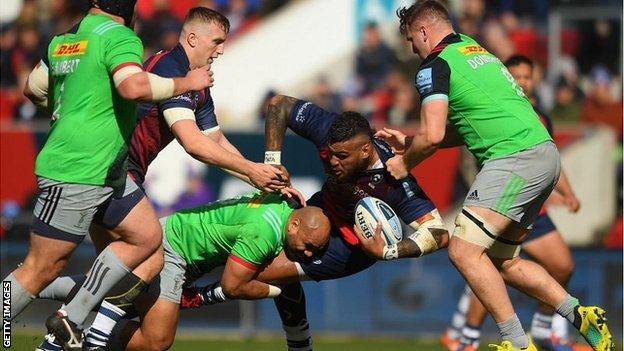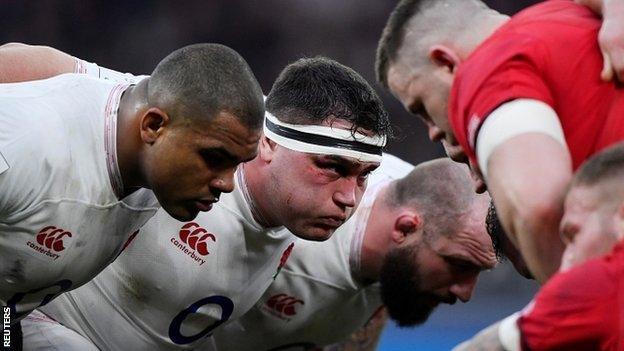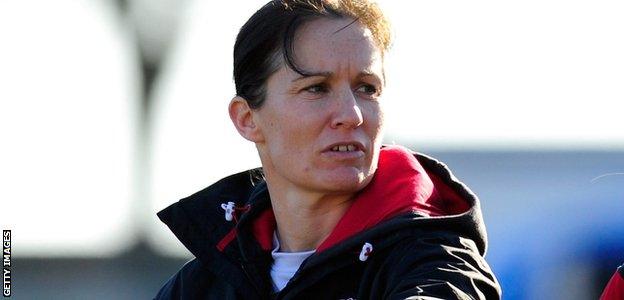How do rugby union players return to action after months in lockdown?
- Published

Bristol beat Harlequins in the last Premiership match on 8 March
With football's Premier League stepping up plans to resume the season and some clubs opening their training grounds, rugby union is also considering its return-to-play policies.
With the last Premiership match taking place on 8 March, how long do players need to prepare before they are fully fit to play again?
And will there have to be compromises to ensure players' bodies can cope with the game's brutal physicality?
Uncontested scrums?
"Every player is going to be different, none more so than props who haven't scrummaged for five to six weeks," said Harlequins and England scrum-half Danny Care on the Rugby Union Weekly podcast.
"Your body will change and I think it will take a fair while for them to get used to scrummaging against people again.
"They're going to have to build up their neck muscles, core, ankles and the calves."
One suggestion to help speed rugby's safe return from former England and Lions wing Ugo Monye would be for uncontested scrums in the early rounds.
"It's summer rugby, let's see the ball in play, let's see some backs moves on brilliant hard surfaces and we can chuck the ball around," said Monye.
"Uncontested scrums will allow forwards to spend a little bit more time in training to get the detail, to get their bodies up to speed technically as well as physically without rushing them."

Jamie George (centre) scrums down for England in the Six Nations victory over Wales in March
Timeframes, risks and injury
BBC Sport understands that Premiership Rugby is working towards a July start date and the sport is on a list to meet with the government to discuss plans to start playing again.
Both Premiership Rugby Limited and World Rugby are developing guidelines but have not published details yet. However, a two-week build-up at home followed by four weeks with a club is understood to be a favoured timeframe by PRL.
Former Wales international and current strength and conditioning coach at Cardiff Blues, Robin Sowden-Taylor explained to BBC Sport: "If we just went back into a normal playing week it's a huge risk.
"You have to avoid big spikes in training volumes because that's where soft tissue injuries happen. Players can pull hamstrings, or any sort of muscular injury can happen. So, it has to be a gradual approach."
As a result, Sowden-Taylor would not be pinned to an exact timeline: "It's subjective. Any shorter than four weeks, is it possible? Potentially, but the less time you have the greater the risk.
"I think everyone in rugby agrees that a four-week period is what is needed. Could we do with more time? Yes, but it's the bigger picture."
Different players, different needs
Each player's needs will be different. England number eight Billy Vunipola recently admitted he avoids watching TV during lockdown as it makes him want to eat.
Speaking on the Scrum V podcast he explained: "I train Mondays, Wednesdays and Fridays, more for weight loss control rather than me being the most professional guy in the world."
Meanwhile, it's a different set of issues for Harlequins wing Chris Ashton: "The biggest thing for me isn't the fitness, it's the timing of things like tackling, passing, stepping."
At the Blues the coaching team will measure each individual's data with the goal of getting players back to their averages during a "normal playing week". Although Sowden-Taylor is keen to stress one of the most important gauges of fitness is: "Assessment by conversation and relationships; sports science is only going to take you so far."
Contact will be one of the last things back on the training list: "We'll introduce some wrestling to start with then build into full contact."
The biggest issue facing rugby as a sport will be the lifting of social distancing measures. As Sowden-Taylor says: "Rugby is a contact sport, there has to be that element there."
What about the women's game?

Former England scrum-half Jo Yapp became director of rugby at Worcester in October
The top women's league in England, where all of the Red Roses play, is the Premier 15s. Its return poses different issues as the league is a mix of both professional and amateur players, meaning preparation for returning players will take longer.
Added to this Foreign Secretary Dominic Raab has already admitted that it will be difficult for amateur sport to return this summer.
Worcester Warriors Women's director of rugby Jo Yapp is in constant dialogue with her coaching team and the RFU.
Most of her team played some form of rugby up until the middle of March but the league has now been declared null and void meaning all preparations will be aimed at a September return.
They hope pre-season can start as originally planned on 13 June with two training blocks allowing around 10-12 weeks of prep.
However, Yapp has been warned this could change: "If that doesn't happen we've been told by the RFU we'll have a minimum of six to eight weeks with players. From our perspective eight weeks would be the minimum we'd want in terms of ensuring that they're in the right physical place to go into contact rugby."
Yapp's side are predominantly amateur, and this brings its own challenges: "We can't get them in every day, that's impossible. We still have to accept these players have to go to work and their recovery is going to take longer than the men's game.
"We have to bear those things in mind and not cram something into four weeks."
However, Yapp knows that the lifting of social distancing will be key to the league's ability to train to play: "The players could come in and do stuff in the gym but realistically running around the field, even if we're not doing contact, they're going to end up less than two metres apart."